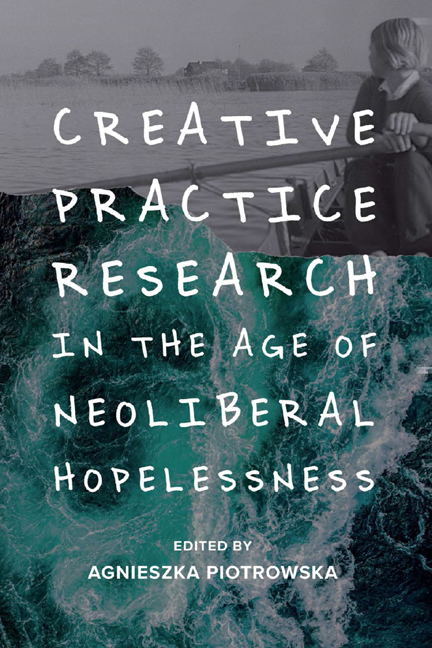Book contents
- Frontmatter
- Contents
- List of Figures
- Notes on Contributors
- Acknowledgements
- Preface: Life in the Post Pandemic Age
- Dedication
- 1 Introduction: Complexities, Compromises and Complicities
- 2 Against the Grain: Women Film Practitioners and Theorists Talk Creative Practice and Theory
- 3 Married to the Eiffel Tower: Notes on Love, Loss and Knowledge
- 4 Creativity and Neoliberalism: Between Autonomy, Resistance and Tactical Compliance
- 5 Tactical Compliance and the Persistence of Elsaesser
- 6 Storytelling and Game Playing
- 7 Autonomy and the Other Woman: Queer Active Agency and Postcolonial Expectations
- 8 From Neolithic to Neoliberal
- 9 First-person Expression on ‘Non-Western’ Screens: China as a Case Study
- 10 Scholarly Exploration of the Creative Process: Integrating Film Theory and Practice
- 11 Teaching Practice as Theory: Guerrilla Filmmaking
- 12 Baits of Falsehood: The Role of Fiction in Documentary or From Untheorised Practice to Unpractised Theory
- 13 Repented: A Creative Intersemiotic Translation
- Notes on Repented
- 14 How do you see me? The Camera as Transitional Object in Diasporic, Domestic Ethnography
- 15 ‘Shut Your Hole, Girlie. Mine's Making Money, Doll’: Creative Practice-Research and the Problem of Professionalism
- 16 Feminist ‘Pensive-creative Praxis’ and Irigaray: A Porous, Dialogical Encounter
- 17 The Paths of Creation, or How Can I Help my Dybbouk to Get Out of Me?
- 18 ‘We Want to Kill Boko Haram’: Reflections on the Photographic Representation of Children in a Displacement Camp
- 19 Between ‘Counter-movement’ (Ingold) and ‘Living with Ghosts’ (Demos)
- 20 Screen Memories: A Video Essay on Smultronstället/Wild Strawberries
- Index
3 - Married to the Eiffel Tower: Notes on Love, Loss and Knowledge
Published online by Cambridge University Press: 17 October 2020
- Frontmatter
- Contents
- List of Figures
- Notes on Contributors
- Acknowledgements
- Preface: Life in the Post Pandemic Age
- Dedication
- 1 Introduction: Complexities, Compromises and Complicities
- 2 Against the Grain: Women Film Practitioners and Theorists Talk Creative Practice and Theory
- 3 Married to the Eiffel Tower: Notes on Love, Loss and Knowledge
- 4 Creativity and Neoliberalism: Between Autonomy, Resistance and Tactical Compliance
- 5 Tactical Compliance and the Persistence of Elsaesser
- 6 Storytelling and Game Playing
- 7 Autonomy and the Other Woman: Queer Active Agency and Postcolonial Expectations
- 8 From Neolithic to Neoliberal
- 9 First-person Expression on ‘Non-Western’ Screens: China as a Case Study
- 10 Scholarly Exploration of the Creative Process: Integrating Film Theory and Practice
- 11 Teaching Practice as Theory: Guerrilla Filmmaking
- 12 Baits of Falsehood: The Role of Fiction in Documentary or From Untheorised Practice to Unpractised Theory
- 13 Repented: A Creative Intersemiotic Translation
- Notes on Repented
- 14 How do you see me? The Camera as Transitional Object in Diasporic, Domestic Ethnography
- 15 ‘Shut Your Hole, Girlie. Mine's Making Money, Doll’: Creative Practice-Research and the Problem of Professionalism
- 16 Feminist ‘Pensive-creative Praxis’ and Irigaray: A Porous, Dialogical Encounter
- 17 The Paths of Creation, or How Can I Help my Dybbouk to Get Out of Me?
- 18 ‘We Want to Kill Boko Haram’: Reflections on the Photographic Representation of Children in a Displacement Camp
- 19 Between ‘Counter-movement’ (Ingold) and ‘Living with Ghosts’ (Demos)
- 20 Screen Memories: A Video Essay on Smultronstället/Wild Strawberries
- Index
Summary
Married to the Eiffel Tower (2008) is the piece of work for which I am probably best known as a filmmaker. I don't particularly like this fact, given that I have done much interesting work since, but this appears still to be the case. Maybe it is the reason why I have never written about the film, at least until I was invited to contribute to a book on Replacement (2018) edited by Naomi Segal and Jean Owen. This piece is a longer version of that chapter and the reason I think it is worth rewriting it here is that in part it is an experiment in language. This time I state it clearly: the practice research here is concerned with the writing, the actual craft of writing and my long-standing desire – and indeed practice – to combine the theoretical and the creative in one article. In terms of the production of knowledge, which appears to be an important factor in the neoliberal university, I am less sure what I arrive at here. Perhaps the simple move to asking questions about how personal narratives affect creative paths can be generative, for it can reveal some caveats and flaws in one's own theorisations. I deploy the autoethnographic mode here, which has featured extensively in this volume, because practice research almost assumes a first-person narrative voice. Perhaps an attempt to explain my own silence has some value as, clearly, the level of complicated emotions and personal narratives exposed in this short essay is not a unique situation.
Married to the Eiffel Tower continues to be screened internationally more than ten years after its first outing on Channel Five in the United Kingdom. I think it is a good piece of work, or very good, but I don't like writing about it. My monograph Psychoanalysis and Ethics in Documentary Film (2014) (based on my doctorate) mentions it in passing, while it has a whole chapter devoted to another film of mine entitled The Conman with 14 Wives (2007) – a relatively obscure piece of work. The reasons for this situation will become clear, I hope, in the course of this essay.
- Type
- Chapter
- Information
- Publisher: Edinburgh University PressPrint publication year: 2020



